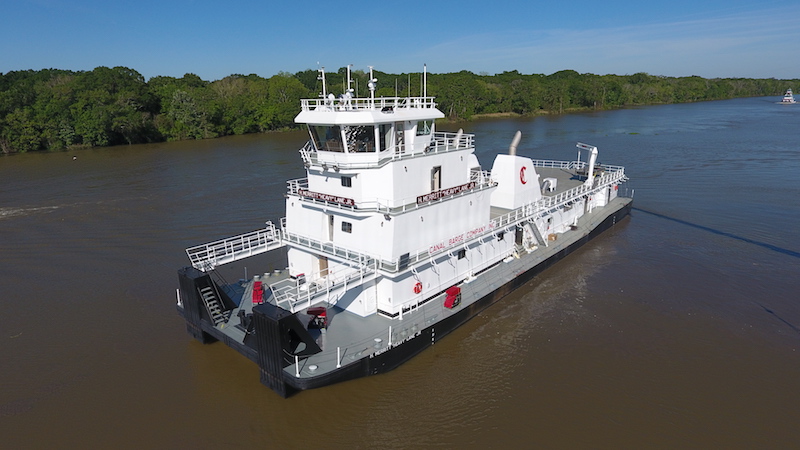In mid-April, Conrad Shipyard, Morgan City, La., delivered a 6,000-hp towboat to Canal Barge Company Inc. (CBC), New Orleans. Built at Conrad Amelia, the 166’x49’x12’4" Subchapter M-compliant H. Merritt 'Heavy' Lane Jr. is powered by Tier 4-compliant EMD 12ME23B engines. The engines are each rated at 3,000 hp (2,238 kW) at 900 rpm.
The towboat utilizes a time-proven design concept that has been enhanced to modern standards through advanced engineering analysis. Efficient operation and attention to crew accommodations and noise reduction were emphasized in the design process. Designed by MiNO Marine LLC, New Orleans, the vessel has a unique hull form to ensure adequate water flow to the propellers in all operating conditions. The design allows the transfer of full power through the propellers, minimizing propeller vibrations transferred to the hull due to unsteady water flow. The design reduces the potential for flow-induced vibration, ensuring greater crew comfort and reduced noise.
The H. Merritt 'Heavy' Lane Jr. has a maximum draft of 10'6". The EMD engines turn a pair of Sound Propeller CF-3 110”x113” wheels in Rice Kort 37 nozzles through Karl Senner LLC-supplied Reintjes WAF4545 gears with 4.429:1 reduction ratios. For ship's service power, the towboat is outfitted with a pair of Cummins QSB7-DM 170-kw, six-cylinder, 1,800 rpm, 4-cycle, turbocharged and aftercooled generators.
For steering, the towboat features two Becker S-C 2250/334 E steering rudders with flanking rudders. Approximate tankage is 132,000 gals. of diesel fuel; potable water, 21,400 gals.; oily water, 2,000 gals.; dirty oil, 2,400 gals.; ballast (total), 27,300 gals.; urea (total), 15,000 gals.; engine lube oil, 1,400 gals.; and 950 gals. gear oil. Important ancillary equipment and systems includes Hiller fire protection, EMI alarm and monitoring, Jotron sound-powered phone, Furuno navigation aid equipment, and Carlisle & Finch xenon search lights.
Crew comfort was considered throughout all phases of the towboat's design process. The superstructure is divided into two sections — one floating and one fixed. All living accommodations are located in the floating section which sits atop air bellow vibration isolators designed to minimize noise and vibration transmission from the operating machinery.
“The floating house, along with strict attention to detail related to the installation of the joiner system, has resulted in a vessel that is extremely quiet and comfortable for the crew during all operating ranges,” said Mike Stone, manager of vessel engineering at Canal Barge.
“The craftsmanship that went into the design and construction of this modern towboat is a testament to our shipbuilding team and their unwavering commitment to quality in every detail," Conrad Shipyard Chairman and CEO Johnny Conrad said in a statement. "We value Canal Barge as a longstanding customer and are grateful for their continued confidence in Conrad Shipyard.”
“We are excited to bring online this new state-of-the-art towing vessel, which is the first 6,000-horsepower EMD of its kind on the inland waterways,” said H. Merritt Lane III, president and CEO of Canal Barge. “CBC has always understood the importance of long- term relationships, including with our vendors. We are pleased with the partnerships we have built and fostered throughout this project, and Conrad Shipyard’s workmanship, in particular, has been extraordinary. The Heavy Lane will clearly be the flagship of our growing towboat fleet.”
CBC is one of the largest and most diverse privately-owned marine transportation and logistics solutions providers in the U.S.




